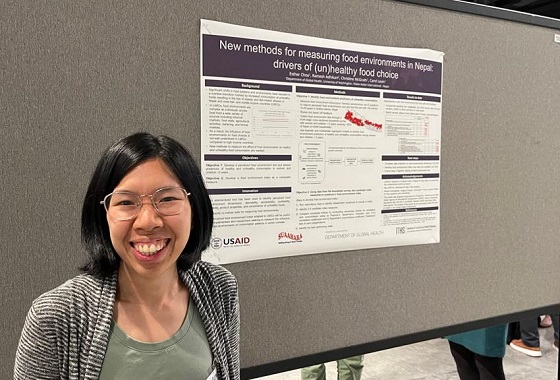December 23, 2022
Esther Choo presents new methods for improving food system strategies in Nepal

Esther at the ITHS/WE-REACH Innovation & Translational Science Expo in September 2022.
Esther Choo, a PhD Candidate in the Global Health Implementation Science Program and Global WACh Pre-doctoral Research Associate recently presented her work related to improving food system strategies in Nepal and on the Strengthening Economic Evaluation for Multisectoral Strategies in Nutrition (SEEMS-Nutrition) project at two scientific conferences. SEEMS-Nutrition seeks to measure costs and benefits of multi-sectoral nutrition interventions in multiple low-to-middle income countries. In Nepal, SEEMS-Nutrition is partnered with Helen Keller International on the Suaahara (meaning “good nutrition” in Nepali) II project to improve the nutrition of women and young children in underserved rural districts.
Esther gave an oral presentation titled, “New methods for measuring food environments in Nepal: drivers of (un)healthy food choice,” at the ITHS/WE-REACH Innovation & Translational Science Expo in September at the Burke Museum of Natural History and Culture in Seattle.
Additionally, in early November, she gave an oral and poster presentation at the virtual Delivering for Nutrition Conference on South Asia organized by the International Food Policy Research Institute (IFPRI).
-
- Oral presentation: Developing a new approach to measure food environments in Nepal (view the slides here)
- Poster presentation: Costing the Suaahara II scaled up nutrition intervention in Nepal (watch the virtual presentation under the Focal Area 2: Evidence on interventions targeted to consumers to shape dietary practices)
The food environment-related work was done in collaboration with UW Global Health faculty members, Dr. Carol Levin (SEEMS-Nutrition Project Director) and Dr. Christine McGrath, Ramesh Adhikari from HKI-Nepal, and Dr. Brian Flaherty in the UW Psychology department. Continuing the progress to measure unhealthy and healthy food consumption in Nepal, Esther will build an innovative food environment index—to measure the availability, accessibility, convenience, affordability, stability, desirability, and marketing of vegetables and processed packaged foods in communities—using data from the Suaahara II project. With this research, she hopes to improve food system metrics to better understand how environments affect what we eat. The results of Esther’s costing work will be combined with the Suaahara II impact evaluation results to conduct a full economic evaluation of the program. Economic evaluations are invaluable tools to help inform decision-making on nutrition interventions to prioritize to improve food systems, dietary intake, and nutritional status.